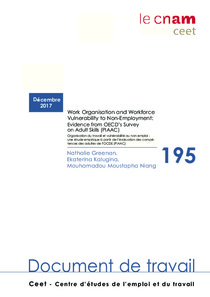Work organisation and workforce vulnerability to non-employment: evidence from OECD's Survey on Adult Skills (PIAAC)
"This working paper examines the relationship between forms of work organisation and vulnerability of the workforce to non-employment. It relies on the data from the first two rounds of the survey on adult skills (PIAAC) carried out by the Organisation for Economic Co-operation and Development...
| Main Authors: | , , |
|---|---|
| Institution: | ETUI-European Trade Union Institute |
| Format: | TEXT |
| Language: | English |
| Published: |
Noisy-le-Grand
2018
CEET |
| Subjects: | |
| Online Access: | https://www.labourline.org/KENTIKA-19398982124911161649-Work-organisation-and-workforc.htm |
| _version_ | 1771659898201833473 |
|---|---|
| author | Greenan, Nathalie Kalugina, Ekaterina Niang, Mouhamadou Moustapha |
| author_facet | Greenan, Nathalie Kalugina, Ekaterina Niang, Mouhamadou Moustapha |
| collection | Library items |
| description | "This working paper examines the relationship between forms of work organisation and vulnerability of the workforce to non-employment. It relies on the data from the first two rounds of the survey on adult skills (PIAAC) carried out by the Organisation for Economic Co-operation and Development (OECD) in 33 of its member or partner countries. Using hierarchical cluster analysis, we identify five forms of work organisation based on the description given by employees of the tasks they perform: Discretionary learning, Constrained learning, Independent, Simple and Taylorist. A multilevel logistic regression is then used to evaluate their impact on vulnerability to non-employment. Vulnerability to nonemployment is defined as the probability to make a transition from employment to nonemployment over a one year period. The results show indeed a significant impact of forms of work organisation on vulnerability to non-employment after controlling for a large number of relevant job and personal characteristics. In particular, employees in Discretionary learning forms of work organisation are the least vulnerable. We also identify labour market policies and institutions which are likely to influence the probability of making a transition to non-employment in relation with the different forms of work organisation. Our results suggest that active labour market policies such as training and employment and start-up incentives amplify the protective effect of Discretionary learning and Independent forms of work organisation as do passive labour market policies for Constrained learning and Simple forms of work organisation. To protect employees in Taylorist forms, expenditures on public employment service and administration, sheltered and supported employment and rehabilitation and direct job creation are to be promoted. A strict employment legislation against dismissals, unlike the strictness of the regulation regarding the use of temporary contract, tends to protect employees in Taylorist forms of work organisation while weakening the protective effect of Simple and Constrained learning forms. Finally, there is a nonmonotonous relationship between the centralisation of wage bargaining and vulnerability. Vulnerability is lower for employees in Constrained learning, Discretionary learning and Independent forms of work organisation when bargaining takes place at an intermediate level, while it is higher for employees in Simple and Taylorist forms and decreasing in the degree of centralisation. It would seem, therefore, that the effectiveness of labor market policies and institutions should be examined in relation with the forms of work organisation prevailing within each country." |
| format | TEXT |
| geographic | OECD countries |
| id | 19398982124911161649_25a0dd08cc1f4121a82a543425b9ef43 |
| institution | ETUI-European Trade Union Institute |
| is_hierarchy_id | 19398982124911161649_25a0dd08cc1f4121a82a543425b9ef43 |
| is_hierarchy_title | Work organisation and workforce vulnerability to non-employment: evidence from OECD's Survey on Adult Skills (PIAAC) |
| language | English |
| physical | 42 p. Digital |
| publishDate | 2018 |
| publisher | Noisy-le-Grand CEET |
| spellingShingle | Greenan, Nathalie Kalugina, Ekaterina Niang, Mouhamadou Moustapha work organization precarious employment labour market policy employment security unemployment Work organisation and workforce vulnerability to non-employment: evidence from OECD's Survey on Adult Skills (PIAAC) |
| thumbnail | https://www.labourline.org/Image_prev.jpg?Archive=132245795042 |
| title | Work organisation and workforce vulnerability to non-employment: evidence from OECD's Survey on Adult Skills (PIAAC) |
| topic | work organization precarious employment labour market policy employment security unemployment |
| url | https://www.labourline.org/KENTIKA-19398982124911161649-Work-organisation-and-workforc.htm |

